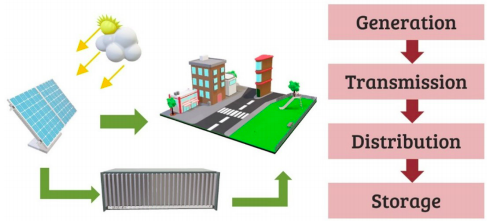


With the installation of large-scale wind and solar power plants and to meet the growing demand for clean and energy-efficient storage systems, the installation and scaling up of Li-ion batteries in grids and PV systems has increased rapidly in the last decade. Li-ion batteries offer high energy and power capabilities and can be configured as per the desired application requirements with varying parameters such as power, energy, and voltage ratings. Lithium-ion batteries are not only emerging as the best choice for EVs but also emerging as efficient energy storage solutions for stationary applications. Lithium-ion based UPS systems coupled with solar PVs, such as Tesla’s Powerwall are replacing the VRLA based battery systems.
Along with the stationary energy storage at home, Li-ion batteries can provide and
maintain energy power
backup in the telecom sector as well where uninterrupted power supply is essential
at all times. Telecom
companies are likely to implement PV modules on their towers to maintain energy
sufficiency, which will
further increase the demand for Li-ion batteries as efficient energy storage
solutions.
New-generation UPS systems utilizing li-ion batteries provide a longer operational
cycle life, high energy
density, power, and are environment-friendly. Moreover, they are inexpensive and are
increasingly
emerging as a desirable product for energy storing commercial and residential
applications. Furthermore,
Government agencies in developed countries are encouraging the residential sector to
become self-sustained and achieve zero-energy targets. Hence, there are significant
chances of growth in regards to the
demand for PV systems. Further increase in demand of li-ion batteries is driven by
the PV system users who
are interested in purchasing li-ion batteries for their residential energy storage
solutions.

As energy storage plays a crucial role in the success of renewable energy technologies; Under the supervision of Prof. Sagar Mitra, NCPRE’s Energy Storage group is focussing on various aspects of battery research; newly efficient, high performance materials and alternative chemistries such as Na-ion, Ca-ion, Mg-ion batteries. With an increase in the emergence of its multiple applicability of batteries, the activities of the group are focused on the development and optimization of prototype cells and tailoring their performance to meet solar applications. In addition to this, activities such as modelling and simulation of cell performance are being looked at to provide insights into further device development.
The development of better materials for conventional Li-ion technology as well as upcoming technologies such as Na-ion is carried out. The ultimate objective of battery development activities at NCPRE is to fine-tune conventional technology, select the best possible alternatives, incorporate the results of the research components and integrate everything to provide solutions for different scales of solar energy storage systems.
